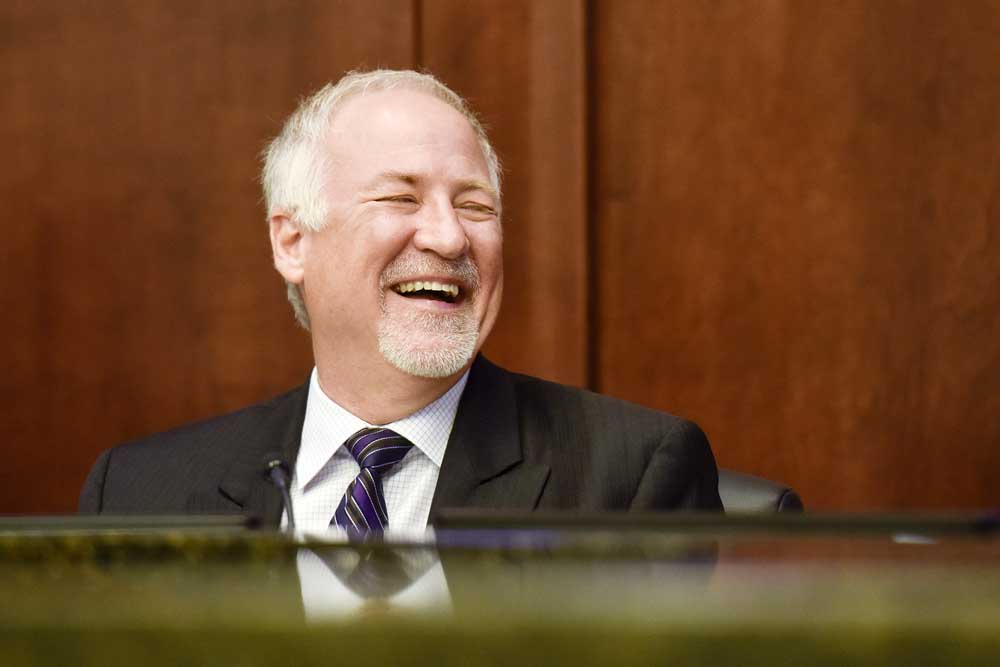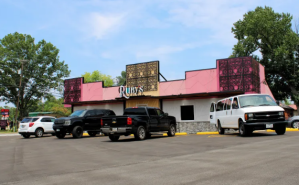Plans for an events center in Tyler pivot toward a hotel and conference facility
Published 4:08 pm Sunday, May 27, 2018

- Mayor Martin Heines laughs during a city council meeting at City Hall in Tyler, Texas, on Wednesday, May 16, 2018. (Chelsea Purgahn/Tyler Morning Telegraph)
Business leaders and the city of Tyler’s early work toward an event center focused on creating an equestrian-style or arena-style events center that, some of the studies said, would be largely privately funded.
From 1991 to 2005, that was the direction they were heading but in the mid- to late-2000s, the city became more involved in the idea of a new tourism center. The idea shifted to a hotel and convention center because the center had the potential to bring tourists in for days at a time, instead of for a single concert or sporting event.
Trending
Meanwhile, the organization now known as the Park of East Texas, which runs the local fair, commissioned studies on building an equestrian-style center. That project, like the arena-style events center, would be shelved in favor of a cheaper, less ambitious plan.
In June 2006, a consulting company issued a feasibility study to Park of East Texas recommending a similar facility to the one that the 1991 study recommended the city build. This one would be smaller than the 1991 recommendation, with an arena floor 225 feet by 125 feet, with seating capacity for up to 2,000 people.
“They (city officials) knew what we were doing,” said John Sykes, the president of the Park of East Texas. “They knew that we were looking at an events center. And quite frankly for the fair to look at the events center alone … it was really incongruent with what we needed at that time.”
“I’m not going to say that they said, ‘Go do this for us,’ but everybody at that time seemed to know what we were doing and how we were doing it, and so we did it,” Sykes said. He said the organization paid for the study with its own money.
Two years, later, in 2008, a company called Bellwood Tyler Property Investments LP came into Tyler with a plan to build what it called the city’s first luxury hotel. The company was looking at a 27-acre parcel on the western side of Loop 323 near Bellwood Lake.
Within months, the city approved zoning changes to facilitate the new hotel. However, the project quickly fell out of the public eye, with little to no explanation. News reports on the company’s abrupt departure are hard to come by.
Trending
Tom Mullins, the CEO of the Tyler Area Chamber of Commerce, said the investors put a lot of work into planning the hotel, including consulting with locals on what amenities should be offered, but essentially abandoned the project during the peak of the Great Recession.
Mullins said the main investor in the project had opened an office in Tyler, purchased a 27-acre parcel of land on the western side of Loop 323, near what is now Sam’s Club, and brought on many investors, including local doctors.
“Just because of the timing and the recession, they just stopped working on it,” Mullins said.
The Park of East Texas kept moving forward. In 2010, Ron Mabry Architects and Gralla Equestrian Architects produced a new conceptual design concept for an ambitious project that included an equestrian-style events center at the Park of East Texas.
The study proposed a main indoor arena measuring 150 feet by 300 feet — larger than the size of the arena proposed in the 2006 study. That arena would be attached to both an exhibition conference area and an outdoor arena. Proposed uses ranged from graduations to indoor soccer games.
Sykes said the project was fun to work on, but would end up being too expensive. He said the organization was not able to fundraise for building the basic infrastructure, such as sewer. In 2013, the organization would release a new, minimalist plan for $13 million.
Around the time the Park at East Texas was pulling away from its ambitious project, the city became more involved creating its own tourism center. The work done during this time period would become the basis for what city and business officials still discuss today.
In 2011, the Texas Legislature passed a new law that allowed the cities of Tyler and Longview to allocate a portion of revenue from hotel/motel occupancy tax — a tax that most municipalities in Texas impose — to construct new convention center facilities.
A few months later, in order to take advantage of the new law, the Tyler City Council voted to overhaul and increase its occupancy tax rate in order to stockpile funds in a new account for a future hotel and convention center project.
That same year, then-Mayor Barbara Bass led the Tyler City Council to commission a study from PKF Consulting and Garfield Traub Development LLC to look at an arena-style events center and hotel and conference center, but not an equestrian-style center.
The final version, released in 2012, recommended that the city put money into a hotel and conference center on a parcel that a private developer — the same one who sold the land to build the Village at Cumberland Park — had offered to donate to the city near the intersection of South Broadway Avenue and Toll 49.
The timing of that recommendation came when the laws on alcohol sales were loosening in Tyler. Four years earlier, in 2008, voters approved a measure to stop limiting serving beer, alcohol and liquor to private clubs. In November 2012, voters allowed beer and alcohol sales at within city limits.
“Our general argument for pushing the wet/dry election was that staying dry made us look like we were stuck in the past, that we hadn’t fully realized the rest of the country left prohibition 80, 90 years ago, so we thought it was an image problem in addition to an economic problem,” said Tom Mullins, the CEO of the Tyler Area Chamber of Commerce.
Officials with the city moved forward with the hotel and convention center project in 2012. Under the plan, the city would pay for the conference center portion of the project, using revenue from the local hotel and motel tax. A private company would put money into a hotel and then operate it, and the city would hire consultants to find that private company.
Another major portion of the project involved construction of a retention pond on the land. The city received approval from regulators at the Texas Commission on Environmental Quality and began work on a roughly three-acre retention pond on the property that would cost $760,733. The city set aside the majority of the money for the pond, but received a $79,700 contribution from a nearby developer.
Things continued moving forward. In 2015, Gov. Greg Abbott signed a bill that makes it easier for the city to use money from the local hotel occupancy tax to build a hotel and conference center. Then-Sen. Kevin Eltife said at the time this would help Tyler’s hotel and convention center project.
Things changed in 2017, when the city decided to terminate a contract with a key vendor — Champ Hospitality. The consultant had been tasked with finding a private investor to put money into the hotel and conference center, but, after the city extended deadlines for the work multiple times, Champ Hospitality did not find that investor.
To move the project forward, the city then hired a company called CBRE Hotels, which brought in Garfield Public/Private LLC. In a major pivot in plans, at the end of 2017, CBRE Hotels produced a report identifying the Rose Complex on West Front Street as the ideal location for a hotel and conference center.
The CBRE Hotels study cost the city $12,866 and marked a major redirect in project plans. The same study from 2012 that identified the location at South Broadway Avenue and Toll 49 as the right location had already ruled out the Rose Complex as a potential site.
City Manager Ed Broussard said in an interview that CBRE Hotels searched for companies that would help develop a public-private partnership to build the hotel because the city was only interested in putting $19 million toward the construction of the conference center.
Broussard said Garfield Public/Private LLC, which had done similar work in Lubbock, was the only company that responded to the CBRE Hotels search, and it was Garfield who encouraged the city to build on the Rose Complex.
Broussard said the company explained that advantages of the Rose Complex is its existing landscape and infrastructure — flat land, sewer lines and a built-in tourist attraction in the Tyler Municipal Rose Garden.
In March, a few months after that study was produced, the Tyler City Council placed an item on its agenda to consider whether to spend about $48,000 to pay Garfield Public/Private LLC, to plan for a conference center at the Rose Complex.
Mark Whatley, a former Tyler City Councilman who now works in private development; Matt Wilson, the developer of the Village at Cumberland Park; and Bob Garrett, whose company donated the land to the city on South Broadway, all attended the meeting.
The three businessmen spoke out against the city’s apparent change of plans, saying that the city had broken a promise to develop a donated piece of land, and there was now a large hole in the Village at Cumberland Park development project where the hotel and conference center should have been built.
At the meeting, Mayor Martin Heines told the three that the land near the Village at Cumberland Park was not feasible because developers wanted the city to put in upward of $30 million for the project. He said he was “admant” about limiting the city’s investment to $19 million, and said it was worth exploring the possibility of building at the Rose Complex.
Mullins, who also attended the meeting, lamented that city and business officials had spent 25 years discussing this project. He said he knew people interested in building a hotel and conference center and that city should re-open the site selection since the one near the Village at Cumberland Park had been ruled out.
Hours of discussion later, the Tyler City Council unanimously voted down the spending item to study the Rose Complex site. Members said they voted that way as a procedural maneuver to keep their options open to discuss the item again in the future.
However, the issue has not been discussed at a City Council meeting since March.







